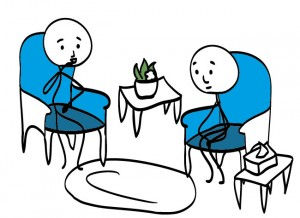At Personal and Relationship Counselling, we offer couples counselling and psychotherapy from our private practice in Plymouth, along with giving clients the option of receiving sessions online. In our post-pandemic world, it is important that clients have a choice about whether they have online or in-person counselling. As a result, you may be wondering which type of session is most suitable for you. This blog post walks you through the different advantages of the two.
Online Counselling
If you are seeking counselling or psychotherapy for the first time, it is normal to feel slightly anxious, in which case it may be preferable to start off by receiving sessions online. Working with one of our therapists from the comfort of your own home allows you to feel more at ease and speak freely about the problems you are facing. It gives you that extra layer of privacy, along with saving you from travel expenses and the anxiety of visiting a new place.
Another important benefit of online counselling is flexibility, which is particularly useful when work/life commitments can make this hard to do on an in-person basis every week. Online counselling is no less meaningful and helpful than meeting face-to-face. The impact of the therapy, in whatever medium, depends on your commitment. More generally, online counselling is the best option for those with a busy schedule. It guarantees that you don’t unnecessarily miss sessions with your counsellor.
Face-to-Face Counselling
While many may feel less anxious receiving counselling online, others will see face-to-face counselling as the only viable way to make true progress with their therapist. Building that in-person rapport with your counsellor in Plymouth may be what you need to properly open up about your feelings. Seeing their body language and feeling their vocal tone is often a necessary aspect of feeling comfortable enough to effectively communicate how you feel.
Furthermore, if you don’t have a peaceful home life, coming to our private practice in Plymouth could provide the safe and dependable space you need. For some people, a counsellor’s therapy room may feel like the only safe place they know. Visiting the same place every week, at the same time, can act as a crucial psychological anchor that lays the template for recovery. This is often the case for young people, or people receiving help with PTSD and other trauma-related issues.
If you are experiencing anxiety, depression, relationship issues, young people issues, or any other issue that you need help with, feel free to get in touch with us to ask any further questions you might have about face to face, online counselling and psychotherapy.

